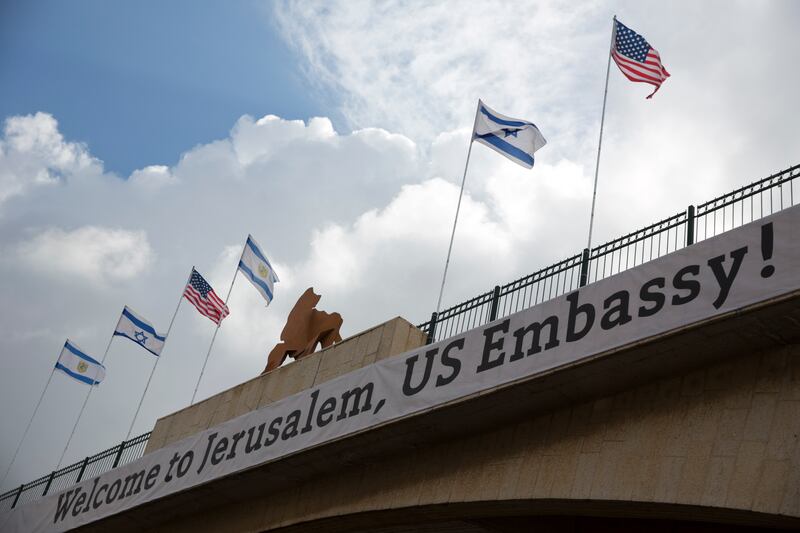SALT LAKE CITY — President Donald Trump has recently drawn attention to his vocal support of Israel, describing himself as a champion of Jewish causes. Last month, he embraced the title “King of Israel” after a conservative radio host said that Trump is “the greatest president for Jews and for Israel in the history of the world.”
Trump even went as far as to declare that Jews who vote for a Democratic candidate are “disloyal” to the Jewish people and to Israel, despite the fact that only 23% of Jews voted for Trump and 74% of Jews in 2018 said they disapproved of how Trump was handling his job.
But Trump’s support of Israel may not be intended to galvanize Jewish voters at all. Instead, Trump’s Israel talk may in fact be energizing a larger part of Trump’s voting base: evangelical Christians.
A recent study reveals that Christian voters see Trump’s approach to Israel far more positively than American Jews do. A survey conducted by the Pew Research Center found that 42% of Jewish voters think that the president sides too favorably with Israel, while 26% of Christians expressed a similar concern. Among evangelicals, the number dropped to 15%.
“The support that Trump has shown for various policies regarding Israel are often far more popular among his evangelical base than they are among Jewish American voters who lean heavily Democratic and are very liberal politically,” said David Campbell, professor of political science at the University of Notre Dame.
A Biblical prophecy
The differences between Jewish and Christian reactions can be explained, in part, by partisanship. Republicans are more likely than Democrats to support Trump’s approach to the region, and most Christian groups lean Republican, while more than 60% of Jews lean Democratic, according to the Pew Research Center.
But the identification of some evangelical Christians with Israel transcends partisanship, and is rooted in faith: the idea that the modern rebirth of Israel and the return of millions of Jews to that land are a fulfillment of Bible prophecy and indicate the Second Coming of Jesus Christ, said Campbell.
The desire for the fulfillment of such a prophecy leads some evangelicals to support a “territorial maximalist” approach to Israel, according to David Myers, professor of Jewish history at UCLA.
“They support Israel’s co-option of land that they believe belongs to a biblical vision of greater Israel because reconstituting greater Israel is a necessary precondition for the ultimate Second Coming of Christ,” said Myers.
A 2011 Pew study among white U.S. evangelicals found that 64% of them believed that helping defend Israel should be “a very important goal” of U.S. foreign policy, compared to 39% among the general population. And 82% of white U.S. evangelicals said they believe that God “gave” the Land of Israel to the Jews, more than double the percentage of American Jews who said the same.
This perspective is more closely aligned with Trump’s most notable policy decisions related to Israel, including his moving of the U.S. Embassy from Tel Aviv to Jerusalem, his recognition of Israel’s sovereignty over the disputed Golan Heights region, and his support of Israel’s decision to deny two members of Congress who have been critical of Israel — Ilhan Omar and Rashida Tlaib — the right to enter that country as part of a congressional delegation.

Evangelicals were far more excited about these decisions, particularly the move of the U.S. Embassy, than American Jews were. Forty-seven percent of American Jews opposed the move, according to the poll by the American Jewish Committee. (It is important to note that Trump’s approach to Israel has earned him the support of a contingent of loyal Jewish voters, many of them Orthodox Jews. A 2018 poll found that over 91% of Orthodox Jews found Trump “satisfactory” or “very satisfactory.”)
U.S. evangelicals have also become the fastest-growing sector of the Israeli tourism market, according to NPR, and Christians United for Israel, an evangelical group, now claims to have 7 million members — the size of about half of the U.S. Jewish population.
And while Jews represent a small percentage of the nation’s voters, evangelicals, on the other hand, are a much more powerful, loyal and energized voting block for Trump to count on in 2020, said Campbell.
“In the case of evangelicals, they’ve demonstrated that they have an enormous amount of political energy,” said Campbell. “This is a group that, if Trump maintains enthusiasm among them, are very likely to do a lot on behalf of his reelection campaign.”
‘A stock phrase of modern anti-Semitism’
Experts say another indicator that Trump is not speaking directly to American Jewish voters when he talks about Israel is what some describe as the anti-Semitic tenor of his “disloyalty” comment toward Jews.
“In my opinion, if you vote for a Democrat you’re being very disloyal to Jewish people and you’re being very disloyal to Israel,” Trump said from the White House. “And only weak people would say anything other than that.”
For many Jews, his statement was rooted in an age-old anti-Semitic trope of Jewish “dual loyalty,” said Myers, in which Jews should be viewed with distrust and fear because they are seen to be incapable of possessing true loyalty to their country.
“This is a stock phrase of modern anti-Semitism,” said Myers. “It’s an insinuation that excites the passions of white nationalists, who are an increasingly potent force in American life.”
Daniel Gordis, senior vice president and Koret Distinguished Fellow at Shalem College in Jerusalem and author of “We Stand Divided: The Rift Between American Jews and Israel,” agrees. He adds that such an approach is unlikely to earn Trump Jewish votes because of its offensive implication that Jews in some way are not truly Americans.
“He was either consciously or unconsciously implying that they’re not really entirely American,” he said. “That caused a lot of discomfort for many Jews.”
“He was either consciously or unconsciously implying that they’re not really entirely American.”
Evangelical Christians have also been vocal about anti-Semitism in the United States.
Most recently, evangelical Christian Laurie Cardoza-Moore, founder of Proclaiming Justice to the Nations, an organization that educates Christians about “their biblical responsibility to stand with their Jewish brethren and all Israel against the rise of anti-Semitism,” called for solidarity with American Jews on the Jewish High Holidays, which begin with Rosh Hashana at sundown on Sept. 29.
She encouraged Christians to stand outside synagogues to guard against attacks, the Jerusalem Post reported.
“As millions of Jews across America prepare to celebrate Rosh Hashanah, many will be fearful of attending services because of the increase in antisemitic attacks,” she said. “I therefore call upon all American Christians to stand vigil outside their local synagogues this weekend to let our Jewish brothers and sisters know that they are not alone. Some have tried to used warped understandings of Christianity to justify attacks against Jews, but nothing could be further from the Bible’s truth. There is no justification on earth for these heinous attacks and no American should feel unsafe in their house of worship.”


